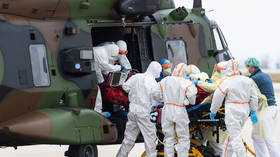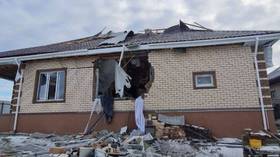Europe needs ‘healthcare NATO’ to deal with Covid-like crises – Berlin

A kind of “healthcare NATO” would make the EU better prepared for pandemics and would prevent the 27-member bloc from losing out amid the global competition between the US and China, the German health minister said.
The European Union needs “a better mechanism for healthcare crises, just like we found one [to deal with] financial crises,” Health Minister Jens Spahn told Germany’s Rheinische Post this Sunday.
The EU [should serve] as the core of an alliance for mutual assistance in case of a pandemic, a sort of healthcare NATO.
Each member state would benefit from that system, Spahn said. All 27 members could source protective equipment from a pan-European stockpile instead of relying on their own national reserves.
While that rationale makes sense, the model itself isn’t flawless, as NATO is plagued by bitter disputes among long-standing allies over defense spending and procuring non-Western equipment.
Also on rt.com The EU’s eye-wateringly expensive Covid-19 rescue plan is likely to only widen the trench between North and SouthNevertheless, Germany – which is set to assume the EU presidency later this year – will champion expanding the European Centre for Disease Prevention and Control (ECDC) “into a kind of European Robert Koch Institute,” the health minister stated, referring to one of the leading institutions that spearheaded the scientific fight against Covid-19 in Germany.
These ambitious plans have a geopolitical dimension, Spahn noted. Europe should rethink its role in the world, “especially in the increasingly bipolar world situation that is defined by China and the United States,” and become less dependent on foreign vendors when it comes to protective equipment.
It should not be decided in China whether a doctor in Berlin, Warsaw, or Paris has the required protective mask or not.
Germany itself received a massive delivery of masks in recent months, with the much-needed face coverings supplied by none other than China.
Also on rt.com EU officials point finger at US tech companies for ‘imposing’ standards on Covid-19 apps, call for more ‘digital sovereignty’EU health bodies faced an avalanche of criticism shortly after the Covid-19 outbreak began among major European countries. Voices inside the union accused its structures of being paralyzed by the rapid spread of the disease and unable to render any meaningful assistance to the worst-hit nations, such as Spain and Italy.
As the crisis grew, EU leaders finally managed to craft a common response, finally agreeing on what was to be done to ensure the provision of medical equipment, boost research for Covid-19 treatment, and support jobs and businesses.
Like this story? Share it with a friend!














